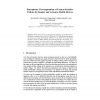855 search results - page 53 / 171 » Using First-Order Logic to Reason about Policies |
IJCAI
1997
13 years 9 months ago
1997
In the paper, we consider the problem of supporting automated reasoning in a large class of knowledge representation formalisms, including terminological and epistemic logics, who...
UM
2005
Springer
14 years 1 months ago
2005
Springer
Inference and decision making with probabilistic user models may be infeasible on portable devices such as cell phones. We highlight the opportunity for storing and using precomput...
23
Voted
KR
2004
Springer
14 years 1 months ago
2004
Springer
Humans have always done nonmonotonic reasoning, but rigorous monotonic reasoning in reaching given conclusions has been deservedly more respected and admired. Euclid contains the ...
FMSD
2006
13 years 7 months ago
2006
Multi-valued logics can be effectively used to reason about incomplete and/or inconsistent systems, e.g. during early software requirements or as the systems evolve. In our earlie...
ATAL
2004
Springer
14 years 1 months ago
2004
Springer
We describe a new smart meeting room system called EasyMeeting that explores the use of FIPA agent technologies, Semantic Web ontologies, logic reasoning, and security and privacy...

